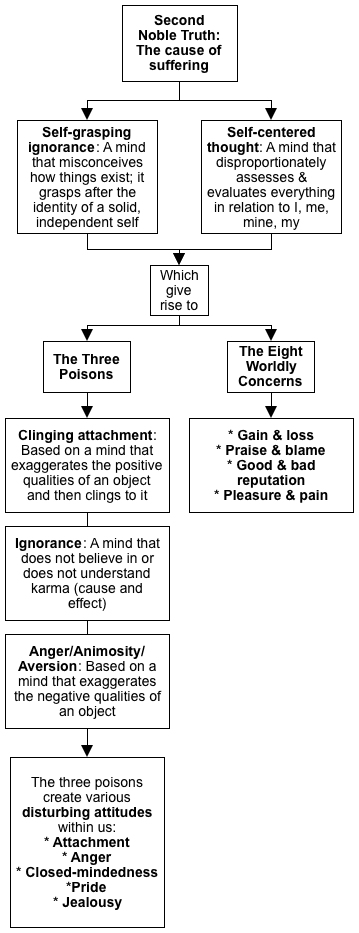Notes
Introduction to the Three Poisons
Self-grasping ignorance (which misapprehends how things exist) & self-centered thought (self-preoccupation) are the root causes of the three poisonous attitudes:
- Ignorance (differentiated from self-grasping ignorance) does not believe in or does not understand karma, cause and effect.
- It is a mind obscured.
- It is also referred to as confusion or bewilderment.
- Even we who believe in karma & its effects don't always act as if we do.
- Clinging attachment is based on a mind that exaggerates the good qualities of someone or something, and then attachment clings, holds, grasps.
- It is sometimes called just attachment, sometimes desire.
- It begins with the ignorance that believes there is a truly existent me & a truly existent object.
- Once you become attached to an object (having exaggerated its good qualities), you don't want to be separated from it and you believe your happiness depends upon it.
- We also get attached to our ideas, our positions, our roles, our way of doing things. We use all these things to construct an idea of who we are, and we fall very easily into the mind of attachment and the mind of aversion (described next).
- Anger/animosity/aversion is based on a mind that exaggerates the negative qualities of someone or something.
- The more attachment we have to something, the more animosity & anger we have when we don't get it or we become separated from it.
Dealing with the Three Poisons
Here are a few guidelines for dealing with the three poisons.
- Try to recognize them when they're small; the larger they get, the more difficult it is to recognize their disadvantages.
- Attachment can be difficult to catch, because often your mind feels happy as an attachment begins. Notice the quality of the happiness:
- When you're happy for a virtuous reason, there's a sense of joy & peace.
- When you're happy due to attachment, there may be giddiness, restlessness, agitation, or even fear.
- Clinging attachment is a set-up for disappointment & dissatisfaction, because we've built something up so much that there's no way to go but down; we're not seeing it clearly for what it is.
- Try stepping back from the attachment and ask, "In the long run, is this going to lead to happiness? Is it truly beneficial?"
- Try imagining getting everything you want. Then ask, "Am I everlastingly happy now?"
- Bring to mind how impermanent the thing is, how it will change over time.
- Letting go of attachment, anger, or ignorance is beneficial, because when we're under the influence of these mental states, we often act in unethical ways.

